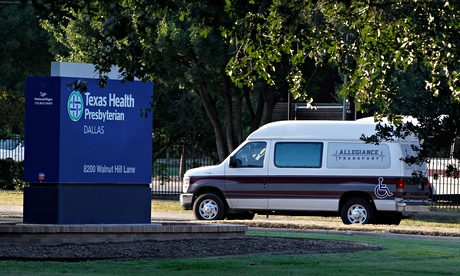
The Ebola patient in Dallas will not be given ZMapp, the experimental drug used to treat several international aid workers and medical staff, including at least two Americans, because stocks have run out.
ZMapp is one of the drugs that is being rushed into trials in the epidemic, along with other drugs that will need more safety data in animals and humans before they are administered to patients.
There have been very few doses available and stocks have now all been used up, but the San Diego-based company behind ZMapp is now pressing ahead with the manufacture of more supplies. It is not an easy drug to make, however. It includes three man-made antibodies to the virus which are grown in tobacco leaves and takes months to produce.
There is no proven drug treatment for Ebola viral disease. Until this year, outbreaks were sporadic, usually fairly swiftly contained and restricted to Africa. The few drugs in research and development for the disease were either still in the laboratory or had been tested only on animals.
When the epidemic in Guinea, Sierra Leone and Liberia spiralled out of control and it was clear that many health workers, including foreigners, were getting sick, the most advanced of these experimental drugs, ZMapp, was pulled out of the cupboard. It was given to two Americans – one a doctor working in west Africa with the charitable organisation the Samaritan’s Purse and the other a missionary. Dr Kent Brantly and Nancy Writebol recovered. However, a Spanish priest, Miguel Pajares, also given ZMapp, died in hospital in Madrid.
William Pooley, the British nurse evacuated to the UK with Ebola, also received ZMapp and survived, but a Liberian doctor, Abraham Borbor, who was given the drug died.
ZMapp performed well in animal trials. A recent study in Nature showed that it had protected 100% of monkeys given the drug. But because the trial took place before the current outbreak, they were not exposed to the Zaire strain that is killing people in west Africa now.
Brantly and possibly some of the other foreigners were also given plasma from people who had survived Ebola, and therefore had antibodies to the virus in their blood. That is a route the World Health Organisation is now exploring, although it may be difficult in a west African setting.
When the flu pandemic scare hit the US and Europe, people rushed to buy stocks of the antiviral drug, Tamiflu. This time there is no drug available – either to treat or to protect people against infection. Drug and vaccine trials are being set up in west Africa at record speed, but it will still take months and probably into next year before scientists and doctors have any real idea of whether anything works.
